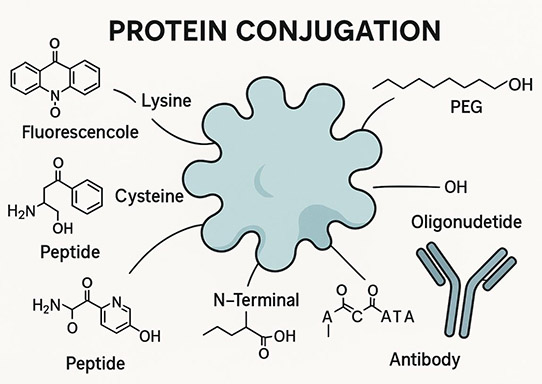Protein Conjugation Services
In the rapidly advancing field of biomedicine, protein conjugation has emerged as a vital technique for enhancing the functionality and applicability of proteins in various applications. At BOC Sciences, we specialize in providing diverse protein conjugation services aimed at optimizing protein performance for research, diagnostics, and therapeutic purposes.

What is conjugating a protein?
Protein conjugation is a biological technique involved in the formation of hybrid molecules by combining two or more proteins or a protein with small molecule entities. Through specific chemical reactions, a covalent bond is created between the molecules, which enables the production of protein conjugates. These protein conjugates are typically synthesized by attaching a protein of interest to another substance such as another protein, peptide, antibody, or small molecule. The extra moiety can be a fluorophore or an enzyme reporter, aiding in the detection and study of the target protein.
What is the function of a conjugated protein?
The significance of conjugated proteins is versatile and encompasses various applications in biological and clinical research. Conjugated proteins provide a greater advantage over unconjugated systems due to their enhanced specificity, sensitivity, stability, and function.
Conjugating a protein with a drug can improve its delivery to target tissues or cells, enhancing therapeutic outcomes while minimizing side effects.
Fluorescent or radioactive tags conjugated to proteins enable sensitive detection and visualization in biological samples, aiding in diagnostics and research.
By conjugating proteins with targeting ligands, such as antibodies or peptides, precise delivery to specific cells or tissues can be achieved, improving efficacy and reducing off-target effects.
Bioconjugation techniques are also employed in protein engineering to modify and study protein structure and function.
Incorporating proteins into polymers or nanoparticles via conjugation imparts unique properties to biomaterials. This is pivotal in tissue engineering, creating scaffolds that mimic native environments and promote tissue regeneration.
Our expertise extends to a broad range of molecules, including small molecules, peptides, antibodies, and nanoparticles.
Through rigorous quality control and in-process testing, we ensure the reproducibility and efficiency of our conjugates. Our dedicated analytical team ensures that the conjugates meet the highest of standards and requirements as per regulatory guidelines.
Our Protein Conjugation Services
We offer chemical crosslinking of proteins or peptides to study interactions or enhance stability and functionality.
We provide enzyme labeling services to attach functional enzymes to proteins for detection or bioactivity enhancement.
We specialize in biotinylation of proteins to enable affinity purification or detection using streptavidin-based systems.
We fluorescently label proteins for applications in imaging, tracking, or binding studies.
We produce or modify glycoproteins with specific glycosylation patterns for functional or structural studies.
We conjugate proteins to gold nanoparticles for use in diagnostics, biosensing, or imaging.
We label proteins with magnetic beads for convenient separation, purification, or immunoassays.
We perform PEGylation to improve the solubility, stability, and half-life of therapeutic or research proteins.
We link drugs to proteins for targeted delivery or controlled release in therapeutic applications.
We conjugate peptides to proteins for vaccine development, epitope mapping, or functional enhancement.
We attach proteins to antibodies to create multifunctional conjugates for diagnostics or targeted therapies.
We link oligonucleotides to proteins for use in molecular diagnostics or targeted delivery systems.
We conjugate proteins with peptide nucleic acids (PNA) for stable nucleic acid binding or detection.
We embed or attach proteins to liposomes for targeted delivery or vaccine formulation.
We provide precise conjugation of DNA to proteins for use in nanotechnology, diagnostics, or molecular assays.
We create protein-polymer conjugates to enhance stability, bioavailability, or delivery of biomolecules.
From Inquiry to Completion: Our Service Flow
Advantages of Working with Us

Our team comprises experienced scientists with expertise in protein biochemistry and conjugation techniques.
We prioritize customization, tailoring our services to meet individual project goals and specifications.
Rigorous quality control ensures the delivery of high-quality conjugated proteins with reproducible results.
We understand the importance of timelines and strive to deliver results efficiently.
We value collaboration and work closely with clients to optimize solutions and achieve desired outcomes.
Where Our Protein Conjugation Are Used?
Immunoassays
Preparation of Enzyme-Labeled Antibodies: Enzymes are conjugated with antibodies for use in detection methods such as enzyme-linked immunosorbent assay (ELISA), to detect the presence and quantify antigens or antibodies. For example, horseradish peroxidase (HRP) can be conjugated to antibodies using glutaraldehyde or sodium periodate methods to produce enzyme-labeled antibodies.
Preparation of Hapten-Protein Conjugates: To generate antibodies against small molecules, haptens must first be conjugated to carrier proteins to form immunogens. For instance, in immunoassays for bisphenol A (BPA), BPA derivatives are conjugated to carrier proteins such as bovine serum albumin (BSA) or soybean trypsin inhibitor (STI) and used to immunize rabbits to produce polyclonal antibodies.
Development of Immunoassay Techniques: Technologies based on biotin/streptavidin conjugation and protein A/G conjugation are used for developing immunoassays. For example, a biotinylated antibody can be linked to a streptavidin-DNA conjugate to construct an immunoassay system.
Protein Structure and Function Studies
Protein-Protein Interaction Studies: Conjugation techniques can link different proteins or proteins with peptides to study their interactions, providing insights into cellular functions and signaling pathways. For example, bifunctional cross-linkers can join two proteins, and the properties of the cross-linked products are analyzed to understand their interactions.
Studies on Protein Structure and Functional Domains: Proteins can be modified or labeled—for example, by conjugating fluorescent molecules to proteins. Observing changes in fluorescence signals helps to study structural and domain-specific changes, as well as intracellular localization and dynamics.
Cellular Experiments
Cell Labeling and Tracking: Fluorescent proteins or other markers can be conjugated to cell surface proteins or receptors for labeling and tracking cells in studies of migration, differentiation, etc. For example, green fluorescent protein (GFP) can be conjugated to a specific membrane protein and visualized under a fluorescence microscope to monitor cell dynamics.
Cell Signal Transduction Studies: Proteins containing signaling molecules can be conjugated to cell surface receptors to study activation and regulation of intracellular signaling pathways. For instance, cytokines can be conjugated to receptors to observe their effects on signal transduction.
Intracellular Protein Localization Studies: Proteins can be conjugated with molecules carrying specific subcellular localization signals to investigate mechanisms of protein transport and localization. For example, nuclear localization signals can be conjugated to proteins to study nuclear import.
Cell Fusion and Hybridoma Preparation: During hybridoma production, cells from different sources can be fused using protein conjugation techniques to generate monoclonal antibodies.
Biomaterial Preparation
Preparation of Biosensors and Biochips: Proteins can be conjugated to materials on biosensor or chip surfaces to produce high-performance devices for detecting and analyzing biomolecules. For example, antibodies or antigens can be immobilized on chip surfaces to achieve specific detection of target analytes.
Preparation of Bionanomaterials: Proteins can be conjugated to nanomaterials to create bionanomaterials with specialized functions for drug delivery, bioimaging, etc. For instance, proteins can be conjugated with gold nanoparticles or quantum dots to prepare materials with targeting and fluorescent labeling capabilities.
Modification of Tissue Engineering Scaffolds: Scaffold materials can be modified by protein conjugation to enhance biocompatibility and cell affinity, promoting adhesion, proliferation, and differentiation. For example, extracellular matrix proteins like collagen or laminin can be conjugated to scaffolds to support cell growth in 3D environments.
Drug Development
Preparation of Antibody-Drug Conjugates (ADCs): Antibodies are conjugated with cytotoxic drugs to create ADCs for targeted therapy of diseases such as cancer. For example, trastuzumab-emtansine is an ADC combining trastuzumab with the microtubule inhibitor emtansine, designed to selectively target and kill HER2-positive cancer cells.
Construction of Drug Carriers: Proteins can be conjugated with drug molecules or carrier materials to create targeted and sustained-release drug delivery systems, enhancing drug efficacy and safety. For example, proteins can be conjugated to liposomes or nanoparticles for targeted delivery.
Modulation of Drug Activity: Protein conjugation techniques can modify drug molecules to improve their pharmacokinetics and bioactivity, increasing stability and bioavailability. For example, drugs can be conjugated with human serum albumin to prolong half-life in vivo.
Other Applications
Affinity Purification: Proteins or ligands with specific binding capabilities can be immobilized on solid supports to purify target proteins. For instance, protein A or G can be conjugated to microspheres to capture antibodies based on their specific binding.
Biomarker Discovery and Validation: Detection probes can be conjugated to proteins to aid in biomarker discovery and validation. For example, on protein chips and other high-throughput platforms, antibodies or detection molecules can be immobilized to rapidly screen and identify disease-related biomarkers.
Protein Metabolism Studies: Isotope-labeled molecules can be conjugated to proteins to study their metabolism and turnover. For example, conjugating isotope-labeled amino acids to proteins enables tracking of synthesis, degradation, and transport processes within cells.
Frequently Asked Questions (FAQ)
We offer a range of protein conjugation services including antibody-drug conjugation (ADC), protein-to-protein conjugation, protein-to-small molecule conjugation, peptide conjugation and protein labeling with various dyes or tags.
Our services ensure high conjugation efficiency, excellent stability of the conjugates, and minimal impact on protein function. We also provide customization options to meet specific project needs.
We can conjugate proteins with a variety of labels including fluorescent dyes, biotin, enzymes, nanoparticles, and small molecules like drugs or linkers.
Turnaround times vary based on project complexity and scale. Generally, we strive to deliver results within 2-4 weeks for standard projects. Expedited services are available upon request.
Yes, we can conjugate proteins of various sizes and structures. Our team will evaluate the feasibility of each project based on specific requirements.
We employ rigorous quality control measures throughout the conjugation process, including validation of starting materials, optimization of reaction conditions, and comprehensive analytical testing of the final conjugates.
Absolutely! We specialize in tailoring our conjugation services to meet individual research needs. Please contact us to discuss your project requirements.
We utilize a range of analytical methods such as SDS-PAGE, HPLC, mass spectrometry, and bioactivity assays to thoroughly characterize our protein conjugates.
Yes, our conjugation protocols are optimized to minimize denaturation or damage to proteins, allowing us to work with a wide range of proteins, including sensitive or delicate ones.
Yes, we can scale up production according to your needs. Please provide details of your volume requirements for a tailored solution. How can I get started with a protein conjugation project?
The process of protein conjugation typically involves several key steps:
Selection of protein and molecule: Identifying the protein of interest and the molecule to be conjugated (e.g., fluorophores, drugs, peptides, polymers).
Chemical modification: Performing chemical reactions to covalently link the molecule to specific sites on the protein (e.g., amine groups on lysine residues, cysteine residues).
Purification and characterization: Purifying the conjugated protein to remove unreacted molecules and confirming the successful conjugation through analytical techniques (e.g., mass spectrometry, SDS-PAGE).
Quality control: Assessing the stability, activity, and functionality of the conjugated protein to ensure suitability for the intended application.
Our state-of-the-art facilities embrace this complex process, offering specific and efficient protein conjugation services personalized to your requirements.
Bioconjugation via amine coupling: Utilizing reactive amine groups (-NH2) on proteins for conjugation with activated carboxylic acids or esters. This method is versatile and widely used for linking proteins with dyes, drugs, or polymers.
Thiol-maleimide conjugation: Exploiting the highly selective reaction between thiol (-SH) groups on proteins and maleimide functional groups. This method is ideal for site-specific conjugation, ensuring controlled attachment of payloads.
Click chemistry: Harnessing bioorthogonal reactions like azide-alkyne cycloaddition to achieve selective and rapid protein conjugation under mild conditions. Click chemistry facilitates precise modification of proteins without altering their native structure.
Genetic fusion: Incorporates genetic engineering techniques to express a fusion protein where the protein of interest is directly linked to a tag or another protein, simplifying the conjugation process.